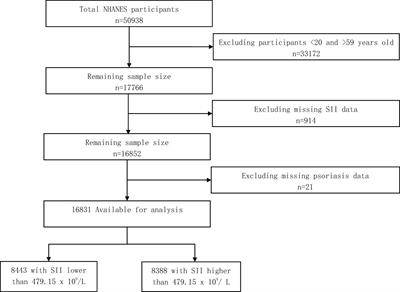Association Between Systemic Immunity-Inflammation Index and Psoriasis Among Outpatient US Adults
Background: Psoriasis is a chronic dermatological condition characterized by a complex pathogenesis that impacts around 3% of adults in the United States and brought enormous social burden.

For many diseases, the systemic immune-inflammatory index (SII), defined as neutrophilis x platelets / lymphocytes, has been recognized as a prognostic indicator.
Therefore, we conducted a cross-sectional study to assess the association between SII and psoriasis among outpatient US adults.: In this cross-sectional study, we used data on the United States adults 20 to 59 years of age from the National Health and Nutrition Examination Survey (NHANES) spanning 2003 -2006 and 2009 -2014. Sample-weighted logistic regression and stratified analysis of sub-groups were used.Results: Among the 16,831 adults, there were 8,801 females and 8,030 males, with a psoriasis prevalence rate of 3.0%. A fully adjusted model revealed a positive association between a SII higher than 479.15 x 10 9 /L and a high risk of psoriasis. According to subgroup analysis and interaction testing (p for interaction > 0.05), age, sex, alcohol drinking status, marital status, and body mass index (BMI)were not significantly correlated with this positive association.Conclusions: Our findings suggested SII higher than 479.15 x 10 9 /L was positively associated with a high risk of psoriasis among outpatient US adults. To the best of our knowledge, this is the first cross-sectional study using NHANES data focused on the risk of higher SII on psoriasis among outpatient US adults.
The outcomes of this cross-sectional serve to supplement previous research, indicating a need for larger-scale prospective cohorts for further validation.
Read the full article at the original website
References:
